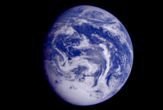Humans Fuel Worst Extinction Since End of Dinosaurs

Changes to Earth's biodiversity have occurred more rapidly in the past 50 years than at any time in human history, creating a species loss greater than anything since a major asteroid impact wiped out the dinosaurs.
That's the conclusion of Global Biodiversity Outlook 2, a report released today by the United Nation's Convention on Biological Diversity.
"In effect, we are currently responsible for the sixth major extinction event in the history of the Earth, and the greatest since the dinosaurs disappeared, 65 million years ago," the report states.
The wide-ranging report also states that demand for resources globally exceeds the biological capacity of the Earth by some 20 percent.
Among the findings:
- The average abundance of species declined 40 percent between 1970 and 2000 while species in rivers, lakes and marshlands have declined by 50 percent.
- Between 12 and 52 percent of species within well-studied higher taxa including birds, mammals and amphibians are threatened with extinction.
- In the North Atlantic, populations of large fish have declined 66 percent in the last 50 years.
- Since 2000, 6 million hectares of primary forest have been lost annually.
- In the Caribbean, average hard coral cover declined from 10 to 50 percent in the last three decades.
- 35 percent of the world's mangroves have been lost in the last two decades.
"Two thirds of the services provided by nature to humankind are in decline, worldwide," said Ahmed Djoghlaf, Executive Secretary of the U.N.'s Convention on Biological Diversity, in an open letter to all of the planet's citizens. "Humans have made unprecedented changes to ecosystems in recent decades to meet growing demands for food and other ecosystems services."
What humans need
Sign up for the Live Science daily newsletter now
Get the world’s most fascinating discoveries delivered straight to your inbox.
The report offers simple economic logic for maintaining biodiversity: "Biodiversity loss disrupts ecosystem functions, making ecosystems more vulnerable to shocks and disturbances, less resilient, and less able to supply humans with needed services."
Biodiversity loss has "weakened nature's ability to deliver its vital services," Djoghlaf writes. "Human activity is putting such strain on the natural functions of Earth that the ability of the planet's ecosystems to sustain future generations can no longer be taken for granted."
The report also makes this appeal: "Apart from nature's immediate usefulness to humankind, many would argue that every life form has an intrinsic right to exist, and deserves protection." It calls for reversing the trends of biodiversity loss by 2010. The convention initially set this goal up in 2002 but cautioned in the new report that little progress has been made.
"What is needed is a Global Alliance that brings governments, business, industry, non-governmental organizations, and the men, women, and youth of this world together in a common endeavor," Djoghlaf said.
Robert is an independent health and science journalist and writer based in Phoenix, Arizona. He is a former editor-in-chief of Live Science with over 20 years of experience as a reporter and editor. He has worked on websites such as Space.com and Tom's Guide, and is a contributor on Medium, covering how we age and how to optimize the mind and body through time. He has a journalism degree from Humboldt State University in California.










